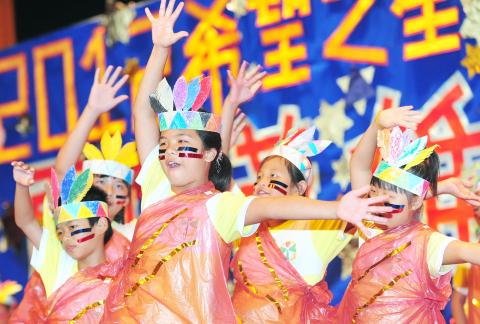New ideas and practices are needed to imporve the Cultural Heritage Preservation Act (文化資產保存法), academics and professionals said at a national forum yesterday, held by the Ministry of Culture to seek public opinions on the nation’s cultural policy.
There are currently 744 designated monuments, 1,031 historical buildings and 42 heritage sites in Taiwan. Since its implementation in 1982, the law has been amended six times.
Taiwan’s way of dealing with cultural preservation is materialistic and focuses only on “objects,” National Cheng Kung University’s professor Fu Chao-ching (傅朝卿) said.

Photo: Liao Yao-tung, Taipei Times
“We spend huge amounts of money restoring buildings, but pay no attention to people,” he said. “It is an elites’ heritage building, since you can’t hear voices from inside.”
National Taiwan University’s Graduate School of Building and Planning professor Hsia Chu-joe (夏鑄九) said this object-obsessed thinking prevents Taiwanese from seeing culture as alive.
“The idea of objects is the origin of Western modernity. This hegemonic discourse views culture preservation in a materialistic manner, as grand monuments,” he added. “Material and non-material cultural heritage is an integral whole. Only the so-called ‘experts’ can’t see it clearly.”
Hsia also said that future amendments to the law should encourage participation from local communities and non-governmental organizations and take into consideration the preservation of collective memories, grassroots identities, traditional living and craftsmanship. Otherwise, it will be difficult to properly preserve sites like Ri Xing Typography (日星鑄字行), one of the last factories in Taiwan to produce traditional Chinese-character lead type, and the Yehyin (野銀) village of the Tao Tribe on Orchid island (Lanyu, 蘭嶼), he said.
Meanwhile, Wang Hui-chun (王惠君), a professor at National Taiwan University of Science and Technology, said the notion of culture as a living thing is important when it comes to preserving Aboriginal cultures.
“We have to think what we want to preserve,” Wang said. “Culture that is constantly changing or items in people’s houses?”
Others urged the government to establish a set of operational guidelines for the implementation of the act so that there are standards for operation.
“When it comes to what to do and how to do things, there is a vast difference among local governments and committee members,” Fu said. “There are many things left unexplained, so people have to make their own decisions that differ from each other and sometimes conflict with international conventions.”
Having been isolated from the international system since its withdrawal from the UN in 1971, Taiwan has a lot of catching up to do to meet international standards, Fu added.
To archeologist and Academia Sinica research fellow Liu Yi-chang (劉益昌), the act reflects a Sino-centric way of thinking.
“Ninety-five percent of the designated historical sites are Han Chinese. Yet Han Chinese heritage only makes up for 1 percent of the human history on the island,” Liu said. “The history of human activities in Taiwan dates back to 50,000 years ago. If we think about it, then we will find the 42 designated heritage sites are far too few.”

US President Donald Trump said "it’s up to" Chinese President Xi Jinping (習近平) what China does on Taiwan, but that he would be "very unhappy" with a change in the "status quo," the New York Times said in an interview published yesterday. Xi "considers it to be a part of China, and that’s up to him what he’s going to be doing," Trump told the newspaper on Wednesday. "But I’ve expressed to him that I would be very unhappy if he did that, and I don’t think he’ll do that," he added. "I hope he doesn’t do that." Trump made the comments in

NOT AN OPENING: Trump’s violation of international law does not affect China’s consideration in attacking Taiwan; Beijing lacks capability, not precedent, an official said Taiwanese officials see the US’ capture of the president of Venezuela as a powerful deterrent to Beijing’s aggression and a timely reminder of the US’ ability to defeat militaries equipped with Chinese-made weapons. The strikes that toppled Venezuelan President Nicolas Maduro signaled to authoritarian leaders, including Chinese President Xi Jinping (習近平), US President Donald Trump’s willingness to use military might for international affairs core to US interests, one senior official in Taipei’s security circle said. That reassured Taiwan, the person said. Taipei has also dismissed the idea that Trump’s apparent violation of international law could embolden Beijing, said the official, who was not

A cold surge advisory was today issued for 18 cities and counties across Taiwan, with temperatures of below 10°C forecast during the day and into tonight, the Central Weather Administration (CWA) said. New Taipei City, Taipei, Taoyuan and Hsinchu, Miaoli and Yilan counties are expected to experience sustained temperatures of 10°C or lower, the CWA said. Temperatures are likely to temporarily drop below 10°C in most other areas, except Taitung, Pingtung, Penghu and Lienchiang (Matsu) counties, CWA data showed. The cold weather is being caused by a strong continental cold air mass, combined with radiative cooling, a process in which heat escapes from

Snow this morning fell on Alishan for the first time in seven years, as a strong continental cold air mass sent temperatures plunging across Taiwan, the Central Weather Administration (CWA) said. The Alishan weather station, located at an elevation of about 2,200m in central Taiwan, recorded snowfall from 8:55am to 9:15am, when the temperature dropped to about 1°C, the CWA said. With increased moisture and low temperatures in the high-altitude Alishan area, the conditions were favorable for snow, CWA forecaster Tsai Yi-chi (蔡伊其) said. The last time snow fell at the Alishan weather station was on Jan. 10, 2018, while graupel fell there